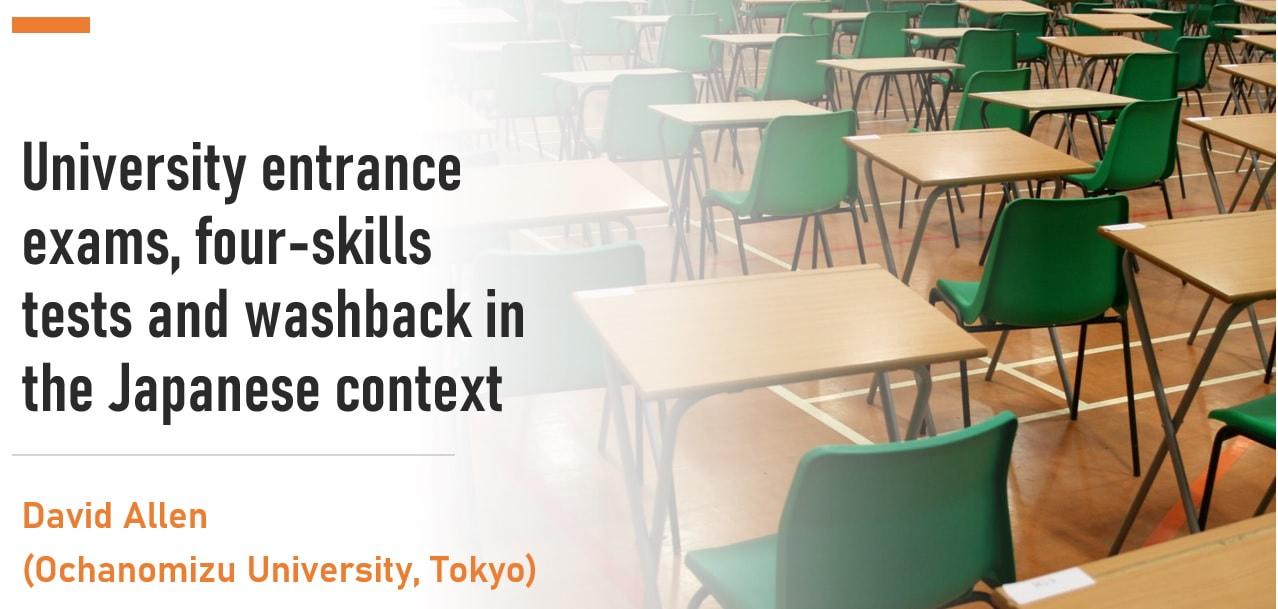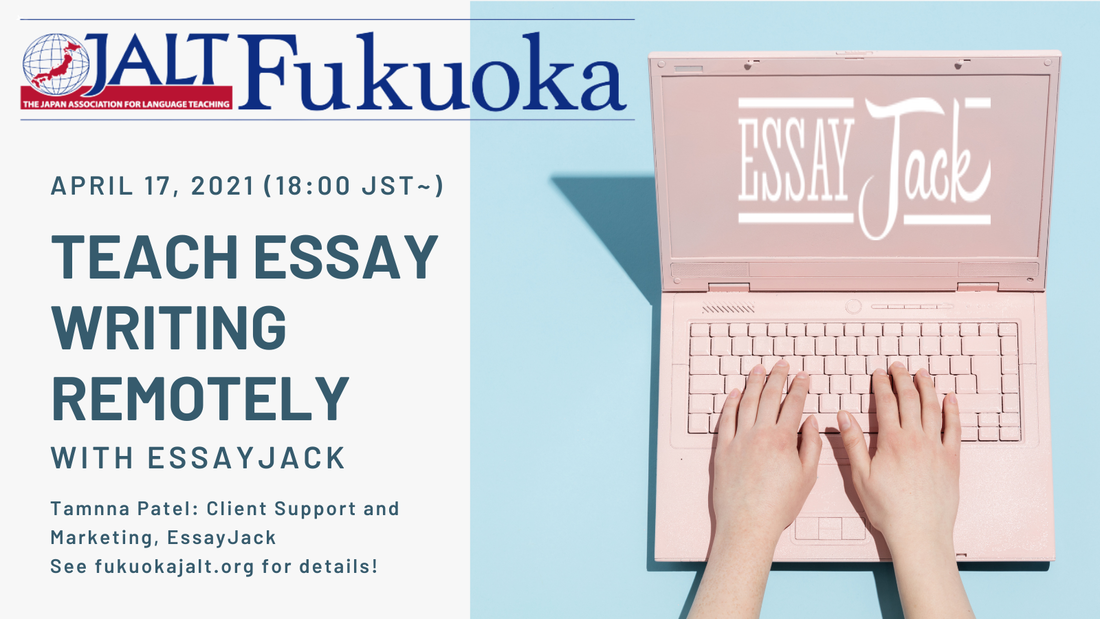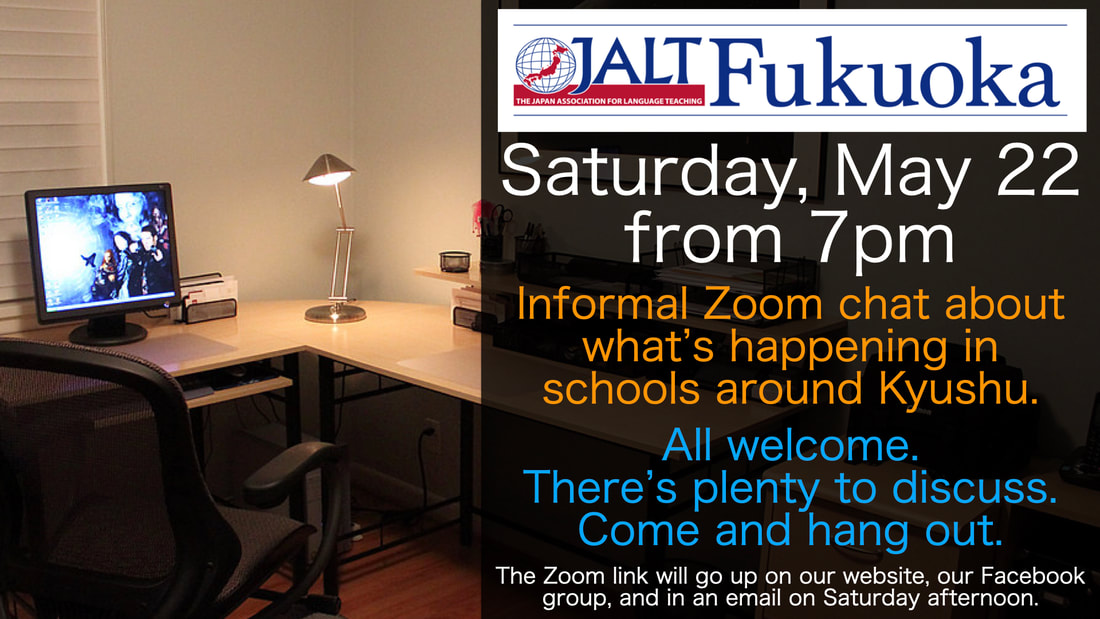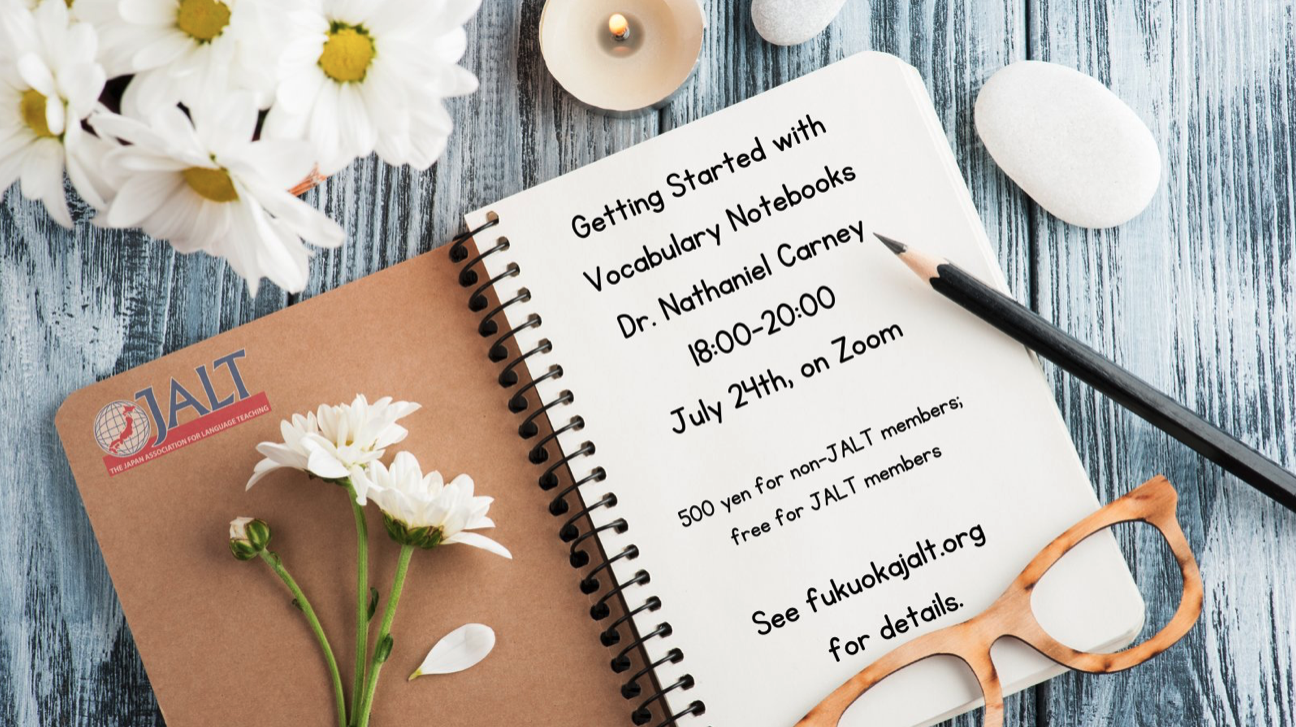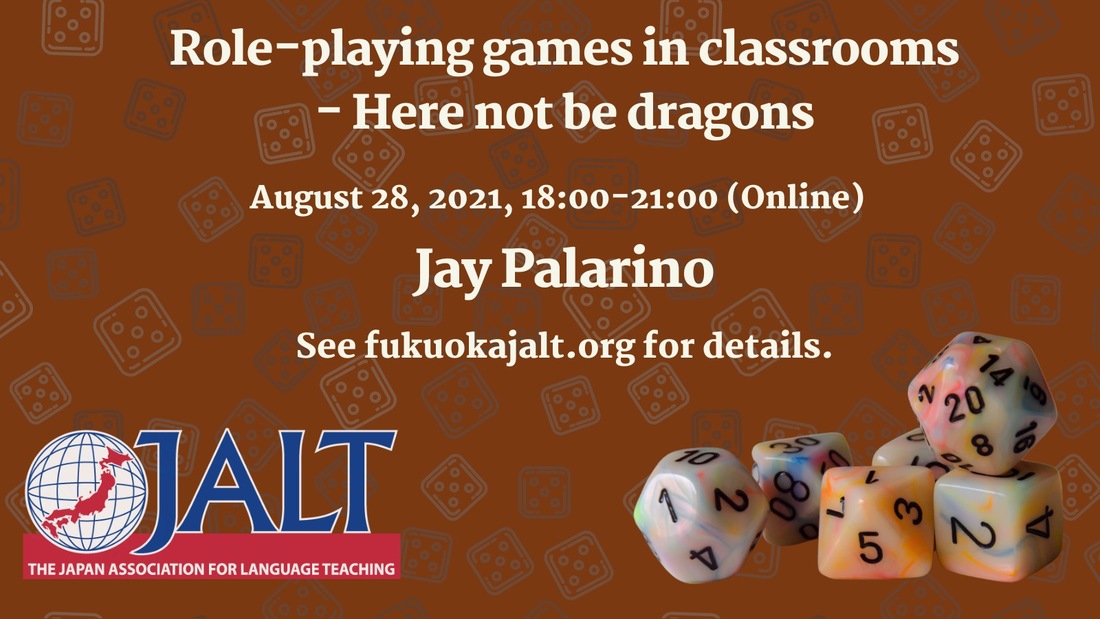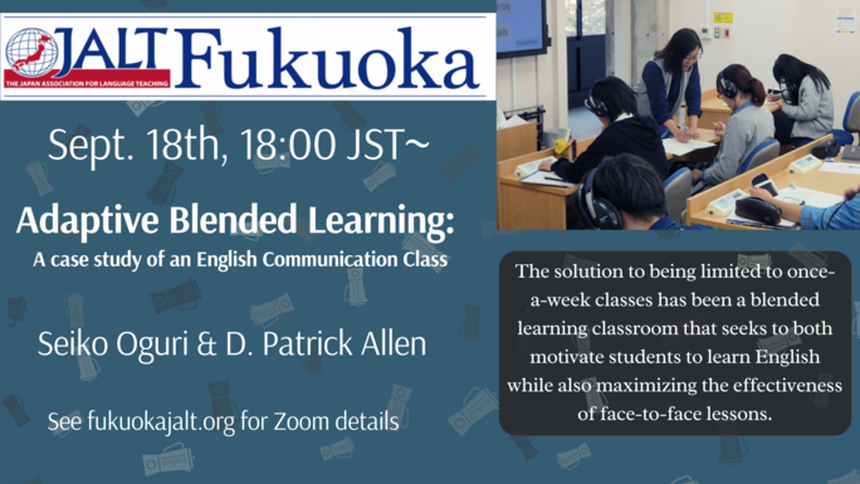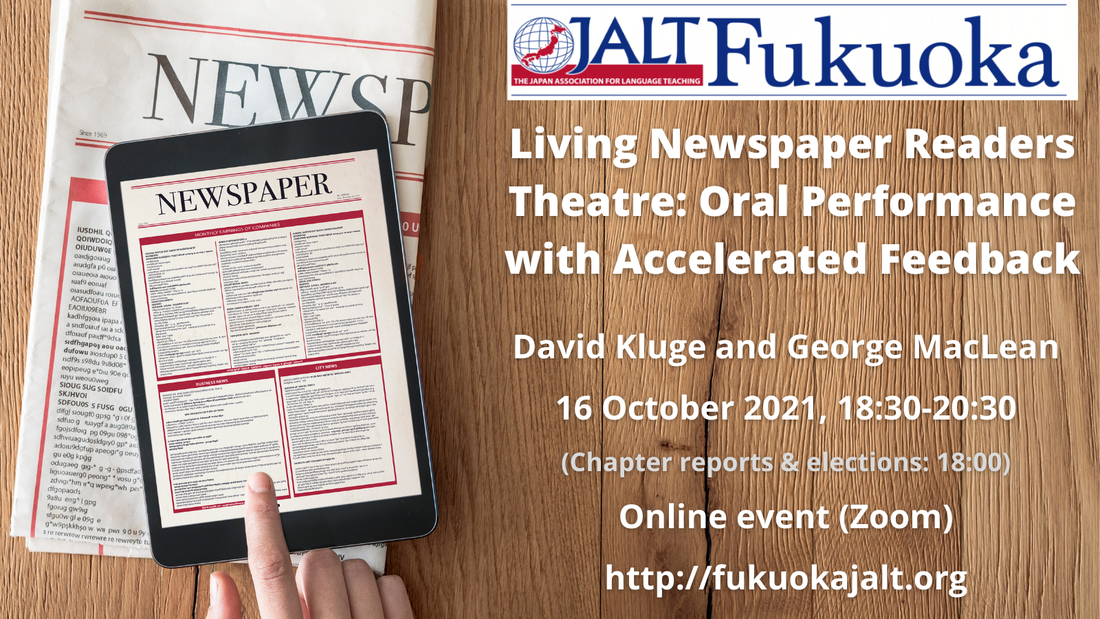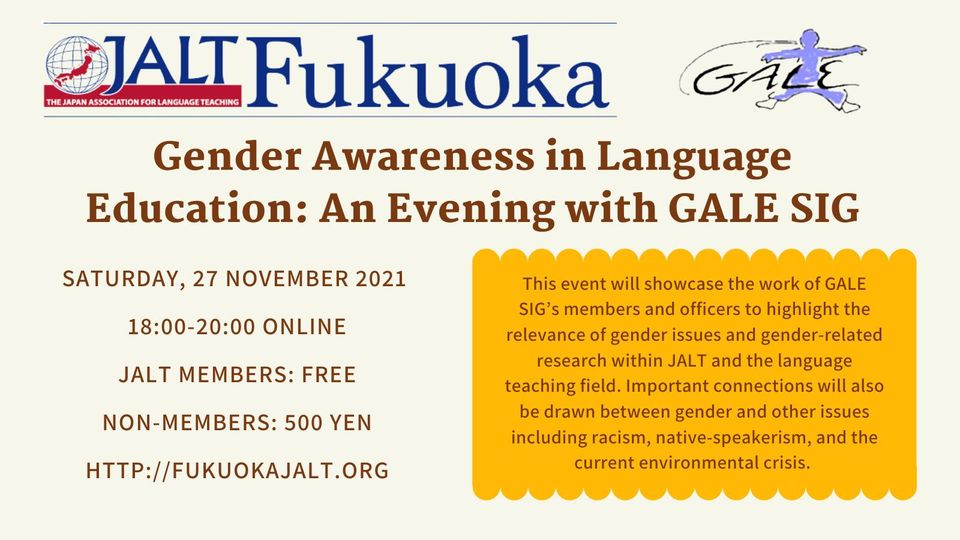2021 Fukuoka JALT events:
January 22, 2021 (Friday)
University entrance exams, four-skills tests and washback in the Japanese context
David Allen (Ochanomizu University, Tokyo)
6:00 pm start, on Zoom. Finishing up around 8:00pm, with a social hangout after the presentation.
Links/details/passwords will be published here on our website, and on our Facebook page, and in an email, on the afternoon of the presentation.
Since the middle of the 20th century, the English education system in Japan has undergone numerous reforms. These ‘communicative’ reforms have sought to modernize English language education, from the traditional grammar-translation methodology with its focus on the written language, to a communicative approach that emphasizes the acquisition of linguistic knowledge as well the ability to apply this through the four skills of listening, speaking, reading and writing (e.g., see MEXT, 2017a, 2017b, 2018a).
As part of the most recent reform, the Ministry of Education, Culture, Sports, Science, and Technology (MEXT) is seeking to reform the use of English examinations for university entrance. In MEXT’s view, without reforming the exams, school teachers will face difficulty in implementing the new curriculum because of the pressure to teach to high-stakes university entrance exams. Consequently, MEXT proposed the abolishment of the English section of the Common Test from 2024 and has recommended that universities utilize one or more of the officially recognized four-skills tests administered by private testing agencies to assess the English ability of applicants.
MEXT’s proposal has received a wealth of criticism, particularly regarding issues of fairness of opportunity, such as the costs involved in taking the tests (e.g., Abe, 2017; Haebara, 2018; JLTA, 2017). However, while many criticisms are legitimate and are made by those seeking to improve the system yet mitigate potential negative impact, in other cases the criticisms appear to be motivated by fundamental differences in opinion on the ideal approach to English language education in Japan (Allen, 2020).
In this presentation, I will describe the reform and its background, the criticisms of the proposal, and the different motivations of those who have criticized it. I will also consider the criticisms of the former National Center Test and note some of the revisions made for the new Common Test, which will be implemented for the first time in January 2021. Moreover, I will summarize some of the criticisms of the current entrance exams administered at universities (i.e., the in-house, second-round exams, or nijishiken). Interestingly, in the discourse surrounding the new proposal, discussion of the limitations of these current exams is conspicuously absent (Allen, 2020).
I will also discuss the washback mechanism and the factors that mediate washback to the learner and the teacher, with reference to studies conducted in the Japan context (e.g., Allen, 2016, 2017; Nagatomo & Allen, 2019; Sato, 2018; Watanabe, 1996, 1997). I will argue that, while washback is a complex process that is mediated by a range of context-dependent factors, washback research is ultimately the only way to truly determine the impact of exams on English education in Japan. I will consider some of the crucial aspects of conducting washback studies – that is, research that involves primary data collection, not mere discussion – so that the research outcomes have the potential to influence English education policy. Such washback research is urgently needed across a wide variety of tests and educational contexts in Japan.
David Allen teaches English language and applied linguistics courses at Ochanomizu University in Tokyo. He has been a teacher in Japan since 2002 and has taught in a wide range of contexts in Japan and the UK. He has published in journals such as Language Teaching Research, Language Assessment Quarterly, and the International Journal of Bilingualism. He has had a long-standing interest in language assessment, and has conducted washback research with research grants from the British Council and the Eiken Foundation of Japan. He is an active member of the TEVAL SIG and is the current editor of its publication, Shiken.
University entrance exams, four-skills tests and washback in the Japanese context
David Allen (Ochanomizu University, Tokyo)
6:00 pm start, on Zoom. Finishing up around 8:00pm, with a social hangout after the presentation.
Links/details/passwords will be published here on our website, and on our Facebook page, and in an email, on the afternoon of the presentation.
Since the middle of the 20th century, the English education system in Japan has undergone numerous reforms. These ‘communicative’ reforms have sought to modernize English language education, from the traditional grammar-translation methodology with its focus on the written language, to a communicative approach that emphasizes the acquisition of linguistic knowledge as well the ability to apply this through the four skills of listening, speaking, reading and writing (e.g., see MEXT, 2017a, 2017b, 2018a).
As part of the most recent reform, the Ministry of Education, Culture, Sports, Science, and Technology (MEXT) is seeking to reform the use of English examinations for university entrance. In MEXT’s view, without reforming the exams, school teachers will face difficulty in implementing the new curriculum because of the pressure to teach to high-stakes university entrance exams. Consequently, MEXT proposed the abolishment of the English section of the Common Test from 2024 and has recommended that universities utilize one or more of the officially recognized four-skills tests administered by private testing agencies to assess the English ability of applicants.
MEXT’s proposal has received a wealth of criticism, particularly regarding issues of fairness of opportunity, such as the costs involved in taking the tests (e.g., Abe, 2017; Haebara, 2018; JLTA, 2017). However, while many criticisms are legitimate and are made by those seeking to improve the system yet mitigate potential negative impact, in other cases the criticisms appear to be motivated by fundamental differences in opinion on the ideal approach to English language education in Japan (Allen, 2020).
In this presentation, I will describe the reform and its background, the criticisms of the proposal, and the different motivations of those who have criticized it. I will also consider the criticisms of the former National Center Test and note some of the revisions made for the new Common Test, which will be implemented for the first time in January 2021. Moreover, I will summarize some of the criticisms of the current entrance exams administered at universities (i.e., the in-house, second-round exams, or nijishiken). Interestingly, in the discourse surrounding the new proposal, discussion of the limitations of these current exams is conspicuously absent (Allen, 2020).
I will also discuss the washback mechanism and the factors that mediate washback to the learner and the teacher, with reference to studies conducted in the Japan context (e.g., Allen, 2016, 2017; Nagatomo & Allen, 2019; Sato, 2018; Watanabe, 1996, 1997). I will argue that, while washback is a complex process that is mediated by a range of context-dependent factors, washback research is ultimately the only way to truly determine the impact of exams on English education in Japan. I will consider some of the crucial aspects of conducting washback studies – that is, research that involves primary data collection, not mere discussion – so that the research outcomes have the potential to influence English education policy. Such washback research is urgently needed across a wide variety of tests and educational contexts in Japan.
David Allen teaches English language and applied linguistics courses at Ochanomizu University in Tokyo. He has been a teacher in Japan since 2002 and has taught in a wide range of contexts in Japan and the UK. He has published in journals such as Language Teaching Research, Language Assessment Quarterly, and the International Journal of Bilingualism. He has had a long-standing interest in language assessment, and has conducted washback research with research grants from the British Council and the Eiken Foundation of Japan. He is an active member of the TEVAL SIG and is the current editor of its publication, Shiken.
February 27, 2021 (Saturday)
Two presentations on Extensive Reading
Mark Brierley and Paul Goldberg
6:00 pm start, on Zoom. Finishing up around 8:00pm, with a social hangout after the presentation.
First presentation:
Using Booklog for Extensive Reading
Mark Brierley
Extensive Reading is an approach to language learning by reading a lot of easy, enjoyable books. It can only work when learners have access to a large range of books at a range of easily determined levels, and libraries are natural allies to proponents of this practice. While libraries are familiar with procedures to buy paper books, and can arrange them in shelves and with stickers to make their levels apparent, digital books present several challenges: finding books; navigating purchasing or licensing; finding funds to pay for them; displaying books to students and indicating how students can access them. Books are available through Maruzen and Ebsco, and our university library allows students to access them once logged into the University's online system. Librarie licenses titles for a limited number of years but requires students to set up accounts. None of these systems gives any indication of the level of books and only work well if you know which book you want to read. We have used a system called Booklog to help students see what books are available and at which levels.
Mark Brierley teaches at Shinshu University, in Matsumoto, Nagano. He has worked on the Extensive Reading Foundation Online Placement Test, an online systems for keeping track of student reading and a database of Graded Readers. He is an editor of JALT ER SIG's ERJ newsletter, and the Journal of Extensive Reading.
Second presentation:
Xreading: What’s New and What’s Next
Paul Goldberg
Xreading is an online library that gives students access to over a thousand graded readers from major publishers such as CUP, Cengage, and Macmillan. Students have unlimited access to all books at all times, and besides the books, they have access to the audio narrations, book ratings, and quizzes. In addition, the system tracks students' reading progress (books read, words read, reading speed, quiz scores, etc.) so it makes management and assessment much easier for teachers.
Since the launch of Xreading in 2014, constant improvements have been made to the system. However, the number of new features were accelerated this past year to help teachers deal most effectively with remote teaching. For example, teachers can now see in real time if their students are actively reading, and send messages to them. In this presentation, the founder of Xreading will explain the new features and functionality that have been added, and review what is planned for the future. Current users of the system who attend are encouraged to provide feedback and suggestions based on their experience.
Paul Goldberg is a native New Yorker. He has an M.S. in Secondary Education from Dowling College in New York, an M.A. in TESOL from Long Island University, and completed the coursework (ABD) for an Ed.D in TESOL at Temple University. He has taught English as a foreign language in Venezuela, Spain, Korea, the US, and most recently at Kwansei Gakuin University in Osaka, Japan. He also has done teacher training for many years, specializing in communicative activities. His main areas of interest are extensive reading and extensive listening. Finally, Paul is the founder of Xreading, which he developed because of his desire to make graded readers more accessible for students, and extensive reading programs easier for teachers to manage. Email: [email protected].
Two presentations on Extensive Reading
Mark Brierley and Paul Goldberg
6:00 pm start, on Zoom. Finishing up around 8:00pm, with a social hangout after the presentation.
First presentation:
Using Booklog for Extensive Reading
Mark Brierley
Extensive Reading is an approach to language learning by reading a lot of easy, enjoyable books. It can only work when learners have access to a large range of books at a range of easily determined levels, and libraries are natural allies to proponents of this practice. While libraries are familiar with procedures to buy paper books, and can arrange them in shelves and with stickers to make their levels apparent, digital books present several challenges: finding books; navigating purchasing or licensing; finding funds to pay for them; displaying books to students and indicating how students can access them. Books are available through Maruzen and Ebsco, and our university library allows students to access them once logged into the University's online system. Librarie licenses titles for a limited number of years but requires students to set up accounts. None of these systems gives any indication of the level of books and only work well if you know which book you want to read. We have used a system called Booklog to help students see what books are available and at which levels.
Mark Brierley teaches at Shinshu University, in Matsumoto, Nagano. He has worked on the Extensive Reading Foundation Online Placement Test, an online systems for keeping track of student reading and a database of Graded Readers. He is an editor of JALT ER SIG's ERJ newsletter, and the Journal of Extensive Reading.
Second presentation:
Xreading: What’s New and What’s Next
Paul Goldberg
Xreading is an online library that gives students access to over a thousand graded readers from major publishers such as CUP, Cengage, and Macmillan. Students have unlimited access to all books at all times, and besides the books, they have access to the audio narrations, book ratings, and quizzes. In addition, the system tracks students' reading progress (books read, words read, reading speed, quiz scores, etc.) so it makes management and assessment much easier for teachers.
Since the launch of Xreading in 2014, constant improvements have been made to the system. However, the number of new features were accelerated this past year to help teachers deal most effectively with remote teaching. For example, teachers can now see in real time if their students are actively reading, and send messages to them. In this presentation, the founder of Xreading will explain the new features and functionality that have been added, and review what is planned for the future. Current users of the system who attend are encouraged to provide feedback and suggestions based on their experience.
Paul Goldberg is a native New Yorker. He has an M.S. in Secondary Education from Dowling College in New York, an M.A. in TESOL from Long Island University, and completed the coursework (ABD) for an Ed.D in TESOL at Temple University. He has taught English as a foreign language in Venezuela, Spain, Korea, the US, and most recently at Kwansei Gakuin University in Osaka, Japan. He also has done teacher training for many years, specializing in communicative activities. His main areas of interest are extensive reading and extensive listening. Finally, Paul is the founder of Xreading, which he developed because of his desire to make graded readers more accessible for students, and extensive reading programs easier for teachers to manage. Email: [email protected].
March 13, 2021 (Saturday)
IB FILM: Teaching and Designing a Western Curriculum in a Japanese Secondary School Context
Cassidy Marra
6:00 pm start, on Zoom. Finishing up around 8:00pm, with a social hangout after the presentation.
In the spring of 2019, I was hired to be a Film Studies teacher in the International Baccalaureate (IB) Program at Fukuoka Daiichi High School. There was no textbook, no curriculum, and the students were all Japanese sixteen year-olds with Eiken Pre-2nd and zero knowledge of film. The only thing I had were three externally assessed projects that the students needed to complete in English within the next fifteen months. This is the story of how I scratched together a Film Studies curriculum and helped my students pass the class.
In this workshop, I’ll be sharing my experiences and challenges in creating a Film Studies curriculum at a Japanese high school. Although the subject matter in my class is “film,” I think that the ideas we discuss here can be applied to any subject that is taken by non-native English speakers but taught and assessed in English. The curriculum I’ve designed is very much a work in progress and in constant need of retooling. As you learn about the standards of the IB Film Studies course, I hope you'll share your ideas.
Some of the topics we’ll examine are:
- What is the IB program? What are the IB FILM assessments?
- What is the core content in IB FILM?
- Film Lesson Planning: Examples of IB FILM lessons
- Reverse-engineering the assessments: how I teach students to “beat” the assessments and why that’s a good thing
- Specific challenges teaching a Western curriculum in a Japanese school context
Cassidy Marra
I've been a language teacher in Japan, Australia and Canada since 2005. I'm not a researcher nor am I a language acquisition theorist. I'm just a simple practitioner. I look at the task that my students need to complete, I assess the obstacles in completing that task, and then I do my best to help the students surmount those obstacles.
IB FILM: Teaching and Designing a Western Curriculum in a Japanese Secondary School Context
Cassidy Marra
6:00 pm start, on Zoom. Finishing up around 8:00pm, with a social hangout after the presentation.
In the spring of 2019, I was hired to be a Film Studies teacher in the International Baccalaureate (IB) Program at Fukuoka Daiichi High School. There was no textbook, no curriculum, and the students were all Japanese sixteen year-olds with Eiken Pre-2nd and zero knowledge of film. The only thing I had were three externally assessed projects that the students needed to complete in English within the next fifteen months. This is the story of how I scratched together a Film Studies curriculum and helped my students pass the class.
In this workshop, I’ll be sharing my experiences and challenges in creating a Film Studies curriculum at a Japanese high school. Although the subject matter in my class is “film,” I think that the ideas we discuss here can be applied to any subject that is taken by non-native English speakers but taught and assessed in English. The curriculum I’ve designed is very much a work in progress and in constant need of retooling. As you learn about the standards of the IB Film Studies course, I hope you'll share your ideas.
Some of the topics we’ll examine are:
- What is the IB program? What are the IB FILM assessments?
- What is the core content in IB FILM?
- Film Lesson Planning: Examples of IB FILM lessons
- Reverse-engineering the assessments: how I teach students to “beat” the assessments and why that’s a good thing
- Specific challenges teaching a Western curriculum in a Japanese school context
Cassidy Marra
I've been a language teacher in Japan, Australia and Canada since 2005. I'm not a researcher nor am I a language acquisition theorist. I'm just a simple practitioner. I look at the task that my students need to complete, I assess the obstacles in completing that task, and then I do my best to help the students surmount those obstacles.
April 17, 2021 (Saturday)
Teaching EFL Students Essay Writing Remotely with EssayJack
Tamnna Patel: Client Support and Marketing, Essay Jack, and
Ayuna Uratani. Value Creator, mangoSTEEMS Japan
6:00 pm start, on Zoom. Finishing up around 8:00pm, with a social hangout after the presentation.
Links/details/passwords will be published here on our website, and on our Facebook page, and in an email, on the afternoon of the presentation.
FREE for everyone - publisher-sponsored.
How do you teach skills like essay writing remotely? How can you provide writing guidance and assistance to students in a structured way when you're not sitting next to them? How can you make sure they're practicing what they learned in online classes? Learn how EssayJack smart writing templates work and how to customize them to fit your lesson plans to teach and guide students' writing from anywhere.
Tamanna Patel has been with EssayJack Inc., an education technology start-up that focuses on teaching writing, since 2018, and currently fills the role of marketing and client support. She has a keen interest in education and how lifelong learning can uplift, empower, and push people to reach their potential. She graduated with a Magna Cum Laude with Honours in Economics and a minor in Management from Clark University in Massachusetts, United States. Previously, Tamanna worked at PwC (PricewaterhouseCoopers), then as an education policy researcher at the Institute for Democracy and Economic Affairs (IDEAS), a Malaysian think tank, before joining EssayJack. When not in the middle of a global pandemic, she’s an avid traveller.
Teaching EFL Students Essay Writing Remotely with EssayJack
Tamnna Patel: Client Support and Marketing, Essay Jack, and
Ayuna Uratani. Value Creator, mangoSTEEMS Japan
6:00 pm start, on Zoom. Finishing up around 8:00pm, with a social hangout after the presentation.
Links/details/passwords will be published here on our website, and on our Facebook page, and in an email, on the afternoon of the presentation.
FREE for everyone - publisher-sponsored.
How do you teach skills like essay writing remotely? How can you provide writing guidance and assistance to students in a structured way when you're not sitting next to them? How can you make sure they're practicing what they learned in online classes? Learn how EssayJack smart writing templates work and how to customize them to fit your lesson plans to teach and guide students' writing from anywhere.
Tamanna Patel has been with EssayJack Inc., an education technology start-up that focuses on teaching writing, since 2018, and currently fills the role of marketing and client support. She has a keen interest in education and how lifelong learning can uplift, empower, and push people to reach their potential. She graduated with a Magna Cum Laude with Honours in Economics and a minor in Management from Clark University in Massachusetts, United States. Previously, Tamanna worked at PwC (PricewaterhouseCoopers), then as an education policy researcher at the Institute for Democracy and Economic Affairs (IDEAS), a Malaysian think tank, before joining EssayJack. When not in the middle of a global pandemic, she’s an avid traveller.
April 2021 "Check-in"
Some of us are teaching 100% in the classroom, some are online, and some are working with a mix of the two. We’re all working within a new set of constraints and restrictions, and just like this time last year, we’re trying to figure out how to make it work.
An hour before our next regular monthly presentation (this coming Saturday), we’re going to open up the Zoom room early and just have an informal hang-out to discuss what’s happening in various schools and universities across the prefecture (and maybe beyond).
Please come along, JALT member or not, and chime in with what’s going on at your school(s) and how things are looking.
We’ll open the room at around 5:00pm, and chat til our presentation begins at 6:00pm. Come and go as you can and need to. (The presentation is free for everyone this month, as it’s a sponsored event.) As usual, there’ll be some kind of hangout after the presentation too.
Zoom details will go out on the day on our website, Facebook, and email. We hope to see you there.
Some of us are teaching 100% in the classroom, some are online, and some are working with a mix of the two. We’re all working within a new set of constraints and restrictions, and just like this time last year, we’re trying to figure out how to make it work.
An hour before our next regular monthly presentation (this coming Saturday), we’re going to open up the Zoom room early and just have an informal hang-out to discuss what’s happening in various schools and universities across the prefecture (and maybe beyond).
Please come along, JALT member or not, and chime in with what’s going on at your school(s) and how things are looking.
We’ll open the room at around 5:00pm, and chat til our presentation begins at 6:00pm. Come and go as you can and need to. (The presentation is free for everyone this month, as it’s a sponsored event.) As usual, there’ll be some kind of hangout after the presentation too.
Zoom details will go out on the day on our website, Facebook, and email. We hope to see you there.
Informal chat/hangout : Saturday, May 22
June 19, 2021 (Saturday)
Fluency awareness as a way to increase speaking ability in a first-year college level English class
Dr. Jenifer Larson-Hall
18:00-20:00
JALT members: free. Non-members: 500 yen.
ONLINE (on Zoom)
Most Japanese college students have spent quite a bit of time studying English grammar and decoding reading but are sorely lacking in fluency in speaking and reading. In this talk I will focus on the issue of fluency as a way of increasing English proficiency and specifically discuss a study I conducted at Fukuoka Jo Gakuin with students in a year-long first-year English class. I tested their fluency before and at the end of the course. The typical student improved by 20 or 30 words and perhaps more importantly, their awareness of the issue of fluency was raised by the testing and by weekly activities in class. The techniques used in class for increasing fluency were to incorporate a speaking test after each 2-3 week topic, making an increase in speaking fluency a portion of their grade, listening to native speakers talk about each topic before they talked themselves, and practicing talking on the same topic with multiple partners in a speaking line. Advantages and drawbacks to the technique I used in class will be discussed.
July 24, 2021 (Saturday)
Getting Started with Vocabulary Notebooks
Dr. Nathaniel Carney
18:00-20:00
JALT members: free. Non-members: 500 yen (see announcement on this page).
ONLINE (on Zoom)
This presentation will be about general use of vocabulary notebooks as well as the specific system I have set up for my students. I will begin by discussing vocabulary notebooks in general—options to think about—and I will mention some references that might be helpful. After that, I will tell you about how I use vocabulary notebooks with my students. I will explain how and why I have been incorporating word and phrase list information into the vocabulary notebooks, and I will explain how I create individual assessments so that each student can be tested on their individual vocabulary list items. I will end by telling you about some of the problems I have experienced, and my plans for the future (of vocabulary notebooks). There will be time for discussion and questions at the end.
Dr. Nathaniel Carney is a professor of English at Kobe College in Nishinomiya, Japan. He has been teaching English in Japan for 15 years. Before that, he taught EFL in Korea and ESL and Spanish in the United States. His main research interests are second language acquisition, testing and assessment, and teacher education.
Dr. Nathaniel Carney is a professor of English at Kobe College in Nishinomiya, Japan. He has been teaching English in Japan for 15 years. Before that, he taught EFL in Korea and ESL and Spanish in the United States. His main research interests are second language acquisition, testing and assessment, and teacher education.
28 August 2021 (Saturday)
Role Playing Games in Classrooms - Here Not Be Dragons
Jay Palarino
18:00-20:00
JALT members: free. Non-members: 500 yen (see announcement on this page).
Role plays are often an activity used to practice functional language. They have been shown to help develop language skills, increase motivation and promote active learning (Sato, 2001; Shen & Suwanthep, 2011; Ip, Linser and Naidu, 2001). Table top role-playing games (TRPGs) have also been shown to have similar positive effects (Randi & Carvelho, 2013; Kaylor, 2017). Though while these ideas are desirable, their ease of entry can be seen as high with many being intimidated by lengthy rules sets and even lingering cultural stigmas. This talk will show ways to bridge those gaps.
Many modern TRPGs have a much easier learning curve. In fact, they go beyond a typical "dungeon crawl" and allow players to design governments, solve mysteries, direct and/or star in movies akin to the Coen brothers or Ghibli, and even safely explore current social issues. The delivery method also is not much more variable ranging beyond paper and pencil to include, decks of cards, coins, QR code readers or SNS messaging with rules sets being no longer than an average teacher lesson plan. Many newer TRPGs are “GMLess” meaning that they are played collaboratively in groups rather than being led by a central story teller.
The talk will show and share four “hacks” of these TRPG ideas that can be replicated by any teacher. It will give outlines of best practices for using these resources within a CLT / TBL framework.
Jay Palarino is a TESOL certified, Cambridge examiner, currently studying for an M.A. in Appiled Linguistics and English Language Teaching. He has over 20 years of experience teaching English, Japanese, and Music in Japan and the US. He is also an active, published board game designer and developer who together with presenter Stephen Case, received the Best of JALT award. He has also been a key note speaker for the JET programme Skills Development Conference on the topic of classroom gaming. He currently teaches at the Fukuoka College of Medical Health and Sports and has a passion for adding effective game-based learning activities into the classroom.
Many modern TRPGs have a much easier learning curve. In fact, they go beyond a typical "dungeon crawl" and allow players to design governments, solve mysteries, direct and/or star in movies akin to the Coen brothers or Ghibli, and even safely explore current social issues. The delivery method also is not much more variable ranging beyond paper and pencil to include, decks of cards, coins, QR code readers or SNS messaging with rules sets being no longer than an average teacher lesson plan. Many newer TRPGs are “GMLess” meaning that they are played collaboratively in groups rather than being led by a central story teller.
The talk will show and share four “hacks” of these TRPG ideas that can be replicated by any teacher. It will give outlines of best practices for using these resources within a CLT / TBL framework.
Jay Palarino is a TESOL certified, Cambridge examiner, currently studying for an M.A. in Appiled Linguistics and English Language Teaching. He has over 20 years of experience teaching English, Japanese, and Music in Japan and the US. He is also an active, published board game designer and developer who together with presenter Stephen Case, received the Best of JALT award. He has also been a key note speaker for the JET programme Skills Development Conference on the topic of classroom gaming. He currently teaches at the Fukuoka College of Medical Health and Sports and has a passion for adding effective game-based learning activities into the classroom.
18 September 2021 (Saturday)
Adaptive Blended Learning: A case study of an English Communication Class
Seiko Oguri & D. Patrick Allen
18:00-20:00
JALT members: free. Non-members: 500 yen (see announcement on this page).
Since its beginning in 2014, the English Communications course developed for incoming robotics engineering freshmen has focused on trying to increase the effectiveness of the limited face-to-face time instructors have with students by creating an environment where students can study English anytime and anywhere, at their own individual pace. The solution to being limited to once-a-week classes has been a blended learning classroom that seeks to both motivate students to learn English while also maximizing the effectiveness of face-to-face lessons. The coronavirus pandemic of 2020 added new challenges to this model as classes had to be adapted for distance learning in a way that still motivated students to become autonomous English learners and help set a foundation for developing English communication skills. Now, as students are returning to face-to-face lessons the curriculum is continuing to adapt to the new norms of academic and social life. This study shares how experiences from conventional blended-learning classes were utilized to restructure a course for distance learning, and then re-adapted for a hybrid of distance and face-to-face learning while still maintaining the original goals of the curriculum.
Seiko Oguri, Professor of EFL at Global Education Center, Chubu University, Vice-director of the Center for Languages and Cultures (2010-2019). Has been involved in English curriculum design using the Internet since the late 1990s. Her recent research interest focuses on changing roles of teachers in the blended learning era and the significance of face-to-face classes.
D. Patrick Allen, Lecturer of EFL at Global Education Center, Chubu University. Director of the Ohio Program for English Language Teaching (OPELT) from 2014-2018. Research focuses on motivation, collaborative learning, critical thinking, and game-based learning.
Seiko Oguri, Professor of EFL at Global Education Center, Chubu University, Vice-director of the Center for Languages and Cultures (2010-2019). Has been involved in English curriculum design using the Internet since the late 1990s. Her recent research interest focuses on changing roles of teachers in the blended learning era and the significance of face-to-face classes.
D. Patrick Allen, Lecturer of EFL at Global Education Center, Chubu University. Director of the Ohio Program for English Language Teaching (OPELT) from 2014-2018. Research focuses on motivation, collaborative learning, critical thinking, and game-based learning.
16 October 2021 (Saturday)
Living Newspaper Readers Theatre: Oral Performance with Accelerated Feedback
David Kluge and George MacLean
18:30 - 20:30~
From 18:00, we will hold our Annual General Meeting. See below for details.
JALT members: free. Non-members: 500 yen (see announcement on this page).
Online on Zoom
This presentation provides two new perspectives about language teaching and a way for more effective reflection on student performance. Long and Crookes (1991) described Task-Based Language Teaching (TBLT) and stated that it, of three approaches to syllabus design, “holds special promise.” In the same paper, they mentioned that “focus on form” (FonF) was an important aspect of TBLT. Both TBLT and FonF are topics of this presentation. One new perspective on a TBLT task is introduced: Living Newspaper Readers Theatre (LNRT). LNRT is a Readers Theatre performance by a group of students of a script stitched together by selecting sections of topically-related news articles (Kluge, 2019). Another new perspective regards providing almost instantaneous evaluation of performances to students via cloud-based feedback. The presentation will first describe what LNRT (Living Newspaper Readers Theatre) is, then how to do it, with examples of performances. The latter part of the workshop will concern how to effectively give immediate online feedback about performances, focusing on form. Specifically, we will show examples of rubrics and discuss how they can be used for giving students feedback, training them about what to look for when giving each other feedback, and how to articulate such feedback to peers. Most importantly, we will describe research we conducted on LNRT and cloud-based feedback, including a focus on form (FonF). We will end with Q & A by attendees.
David Kluge (Nanzan University) is co-coordinator of the JALT Performance in Education SIG and has been teaching English for over 40 years. His interests are speech, drama, debate, Readers Theatre, oral communication, and materials writing. He has published four books for Cengage/National Geographic Learning and Macmillan. (47 words)
George MacLean is a professor at the University of the Ryukyus. He has given over fifty workshops and presentations in over a dozen countries in the past decade. He serves on editorial and review boards for several educational journals and international conferences. His research interests include SLA and ICT implementation.
David Kluge (Nanzan University) is co-coordinator of the JALT Performance in Education SIG and has been teaching English for over 40 years. His interests are speech, drama, debate, Readers Theatre, oral communication, and materials writing. He has published four books for Cengage/National Geographic Learning and Macmillan. (47 words)
George MacLean is a professor at the University of the Ryukyus. He has given over fifty workshops and presentations in over a dozen countries in the past decade. He serves on editorial and review boards for several educational journals and international conferences. His research interests include SLA and ICT implementation.
27 November 2021 (Saturday)
Gender Awareness in Language Education: An Evening With GALE SIG
Quenby Hoffman Aoki and members of the GALE SIG
18:00-20:00
JALT members: free. Non-members: 500 yen (see announcement on this page).
Venue: Zoom
As the GALE SIG Website states: “GALE works toward building a supportive community of educators and researchers interested in raising awareness and researching the ways in which gender plays a role in language education and professional interaction” (https://www.gale-sig.org) The SIG has a fourfold mission statement:
In addition to collaborative events with other JALT Chapters and SIGS, GALE publishes the GALE Newsletter and the scholarly, peer-reviewed GALE Journal, both available on the SIG website above.
This event will showcase the work of GALE SIG’s members and officers in order to highlight the relevance of gender issues and gender-related research within JALT and the language teaching field as a whole. Important connections will also be drawn between gender and other issues including racism, native-speakerism, and the current environmental crisis. First, SIG Coordinator Quenby Hoffman Aoki will discuss the role GALE plays within JALT and reflect upon the significance of GALE in her professional and personal life. Next, Eucharia Donnery, Membership Chair and Treasurer, will share details of her long involvement with the SIG. Assistant Journal Editor Sue Sullivan will talk about GALE SIG publications. Anna Walker, Publicity Chair, and a relatively new member of the JALT community, will then describe her experiences of “stepping up and jumping in” when new energy was needed in GALE SIG, and of getting started as a researcher in gender-related issues. Two GALE members will then present their research. Brent Simmonds, former Membership Chair, current Member-at-Large and 2020 PanSIG Forum speaker, and Carey Finn-Maeda, JALT 2021 Forum Speaker, will describe classroom activities which demonstrate the relationships between gender, race, and the current climate crisis. Carey Finn-Maeda will then share her professional narrative of returning to work in the ELT field in the midst of a pandemic, including the adjustment to teaching online. This event will be interactive, and reflection and discussion will be encouraged
Quenby Hoffman Aoki, Seikei University
Eucharia Donnery, Soka University
Sue Sullivan
Anna Walker, University of Nottingham
Brent Simmonds, Nandan University
Carey Finn-Maeda, Tamagawa Academy High School
- to promote research in the relationship of gender to language learning and teaching
- to develop and improve inclusive teaching practices and materials
- to raise awareness of workplace and classroom issues related to gender
- to provide networking opportunities for language-teaching professionals interested in gender and its intersections with other identities such as race, social class, and ability/disability
In addition to collaborative events with other JALT Chapters and SIGS, GALE publishes the GALE Newsletter and the scholarly, peer-reviewed GALE Journal, both available on the SIG website above.
This event will showcase the work of GALE SIG’s members and officers in order to highlight the relevance of gender issues and gender-related research within JALT and the language teaching field as a whole. Important connections will also be drawn between gender and other issues including racism, native-speakerism, and the current environmental crisis. First, SIG Coordinator Quenby Hoffman Aoki will discuss the role GALE plays within JALT and reflect upon the significance of GALE in her professional and personal life. Next, Eucharia Donnery, Membership Chair and Treasurer, will share details of her long involvement with the SIG. Assistant Journal Editor Sue Sullivan will talk about GALE SIG publications. Anna Walker, Publicity Chair, and a relatively new member of the JALT community, will then describe her experiences of “stepping up and jumping in” when new energy was needed in GALE SIG, and of getting started as a researcher in gender-related issues. Two GALE members will then present their research. Brent Simmonds, former Membership Chair, current Member-at-Large and 2020 PanSIG Forum speaker, and Carey Finn-Maeda, JALT 2021 Forum Speaker, will describe classroom activities which demonstrate the relationships between gender, race, and the current climate crisis. Carey Finn-Maeda will then share her professional narrative of returning to work in the ELT field in the midst of a pandemic, including the adjustment to teaching online. This event will be interactive, and reflection and discussion will be encouraged
Quenby Hoffman Aoki, Seikei University
Eucharia Donnery, Soka University
Sue Sullivan
Anna Walker, University of Nottingham
Brent Simmonds, Nandan University
Carey Finn-Maeda, Tamagawa Academy High School

